Ruth Yeboah is a passionate advocate for women. Born in Ivory Coast, she immigrated to the Bronx, New York as a young teen. Ruth was raised in a religious home where she developed a love for Jesus Christ and a Christian life. She went on to become a Child Protective Specialist, a foster care system Case Manager, and currently works as a Victim’s Advocate for the U.S. Air Force. Ruth founded Women of Value Inc., a non-profit focused on enriching the lives of women, and Le Regard Apparel, a nursing and pumping friendly clothing line. Ruth continually seeks to build a legacy of service as she uplifts and empowers women.
Tell me about your upbringing.
I was born in Ivory Coast. My mom is Ivorian and my dad is from Ghana. They both met in Ivory Coast over 45 years ago. When I was 12 years old, we relocated to the Bronx, New York. I am the ninth of ten children. There were some struggles when we lived in Ivory Coast, but my parents made sure we didn’t really feel the struggles. I didn’t actually recognize the struggle that we experienced until I started going back to Africa as an adult. When I was in it, I didn’t feel like I lacked anything. Even though my parents had a lot of children, they made sure to provide. My dad was a full-time minister. I don’t ever recall my dad working outside of ministry during my childhood. My mom was a worker. She managed the home and took care of all of us. We had nannies and other people who helped out as well. It literally takes a village to raise a child. I had a really happy childhood. There was not much to worry about because joy was not dependant on materialistic things.
What was it like growing up in a religious home where your father was a minister?
It was really amazing. My dad is still a minister to this day. One thing I remember that I tried to keep over the years was the fact that my parents would not let us go out before praying. All the children would gather with them in a circle and take turns going around and praying. That’s one thing that was instilled in me from the very beginning. My faith in the Lord was built and created because of what my parents gave us. It wasn’t like I needed to develop faith later. It grew with time as I had experiences that built and shaped my faith. Growing up in a Christian home definitely determined my values and standards that I stand for up to this day. It made me what I am.
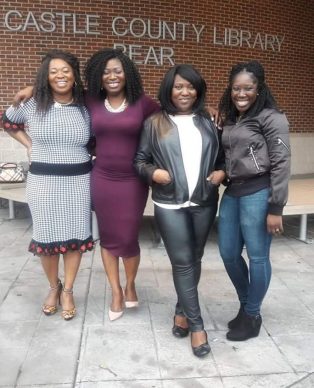
Ruth with her sisters.
What brought your family to the United States?
If you ask any immigrant family they will likely tell you it’s because of the opportunities that exist here. Some run because of wars or for refuge. We came specifically to increase our opportunities of survival. In Africa, the opportunities are limited even if you are smart. You may be intelligent, but you may not have a scholarship or the opportunity to get a job after you graduate from college. That’s the difference between staying in Africa and moving to America. The American dream alludes to that. You come here and things will be better. You come here and you can strive. One way or another, the American dream is true, but also very mythical. It’s not always gold and bright. It’s what you make it. That was our reason for leaving our home and country and coming to a completely strange nation.
How did you adjust to your new home and country?
The Lord created me to have an inner strength that allowed me to adapt to changes, cultures, different circumstances, and new environments. Coming here, the first difficulty was the language barrier. The national language in Ivory Coast is French. I started school two weeks after we got here and I didn’t know a word of English. I only spoke French.
Eventually, I looked beyond the language and it became a matter of dealing with the community. The students that I was involved with and the people I would encounter attempted to bully me. I say attempted because I did not allow myself to be bullied. I have plenty of stories about their attempts to bully me. I was just the wrong person to bully. I had to reidentify who I was because I was in a community of African Americans and hispanics and some caucasians. I didn’t expect the treatment I received from people that looked like me. I grew to understand that African Americans identified themselves completely differently than Africans. It wasn’t based on color, but on culture. Eventually I understood that. It took years of adaptation and learning for me to realize that we’re not just all black. It’s a cultural matter.
I realized that people do what people do because of how they feel about themselves. If someone hit me, I hit them back. That wasn’t an issue. But I couldn’t verbally respond because I didn’t speak a word of English. My English and French dictionary became my best friend. I read it like a book from cover to cover. For someone who spoke no English when I came, I progressed quickly. I started here in 8th grade and ended that year at the top of my class.
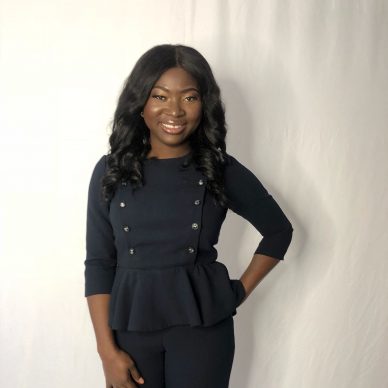
Ruth Yeboah.
Since you’ve lived the immigrant experience, do you have advice on how to be more welcoming to immigrants or people who appear different from you?
When people meet you, they try to magnify their differences. The key whenever you meet anybody is to find common ground. It doesn’t matter whether they are immigrants or not. They could be from New York and you could be from Virginia. A person is different from you in whatever terms and you need to find what makes you similar. Tell yourself that people are people. If you’re cut, you bleed. If I get cut, I bleed. There’s no need to try to dichotomize people or categorize people. That’s part of the problem we have is that people try to make others feel that they are different.
I think that ultimately, it’s about knowing that this is a human being that I’m interacting with. Whether they are blue, black, or white, it does not matter. It’s a human being that deserves respect and I’m going to treat them as such. A way to approach someone isn’t to point out what’s different about them. Like, “Oh, your hair is different” or “your accent is different.” That’s not a way to start a conversation when seeking connection. Instead, find the common ground.
If I’m in church and testify and then you come up and say, “I heard you have an accent, where are you from?”—that doesn’t make sense. A better way to introduce yourself would be to say, “Hi Sister, that was a powerful testimony.” If you’re coming to talk about what I said then make that you’re introduction, not my accent. Focusing on the testimony creates connection and allows us to grow from there.
When did you discover the Church and decide to be baptized?
I joined the Church 19 years ago in the Bronx, New York. The environment was definitely different there. It was very diverse, very welcoming, very different. When I arrived in the United States in 1999, I went to live with my sister. My sister was a member and her husband was too. I lived with her and inevitably went to church with her every Sunday. I went for probably a year. There was a girl living with us who was being taught by a missionary couple. They came one day to teach her and she wasn’t there, so they asked if they could teach me. I went to church for a while before I got baptized. This couple was like family. They took us to the zoo, they loved us and they did a lot with us. I was young and liked them. I’m still friends with them, like family. They loved their mission so much that they went to Ghana to serve another mission. Their example led me to baptism.
You have since become a dedicated advocate for women. How did this passion develop?
I’ve always had something for taking care of and helping women—I’m naturally a philanthropist. I feel like women have been burdened by society in many ways. I think it’s time that women free themselves from societal expectations. Because of what society has said to women and about women, many women feel pressure to live up to the status quo even if the status quo doesn’t benefit them. I’m of the school of thought that you need to teach a women, educate a women, and empower a women to make her own decisions.
I feel like because there is so much pressure on women they succumb to things. I have become a Victim’s Advocate for the military, which goes along with what I’ve always wanted to do—to be there for women and help women. I help mostly victims of domestic violence in the military, primarily military spouses, navigate that hard time of their life. Most times it leads to divorce. Sometimes people stay. They don’t know what to do. My job is to educate them on the dynamics of abuse and what abuse does to you, and really provide them the resources they need to move into the next stage of their life.
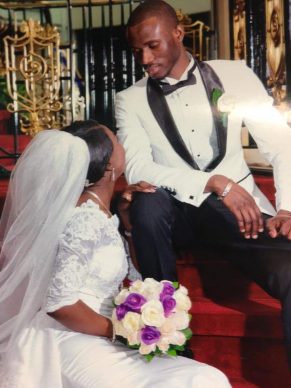
Ruth and her husband on their wedding day.
In addition to victim’s advocacy, you also run a nonprofit. Could you tell me more about the work you do there?
I’m the founder of Women of Value, Inc. The mission is to provide women virtual, emotional, social, educational, financial, and physical help to uplift, enlighten, and empower them. It’s to help them rise from the ashes. There really are so many things that plague women. So much trauma, so many issues, and so much abuse that women grow up with. What we end up doing is we bottle it all inside. We try to be functional human beings. No matter how successful you are, if you don’t address the things that happened in your childhood or the things that happened to you that you never faced, eventually it comes crashing down. It could be something really minimal—it doesn’t need to be abuse. It doesn’t have to be that deep. It could be something like being neglected by your parents. You may not feel that it was a big deal because you made it out alive. Later you may realize that you’re carrying that neglect over into your marriage, childbearing years, and parenting. We work to recognize the way we live and address those issues within ourselves.
We do workshops on financial freedom: how to budget, how to save, and how to invest. One of the things that causes women to stay in abusive relationships or for women to feel like they’re going in circles, is their money. A lot of women aren’t educated about what to do with money. We also do self-esteem and relationship workshops. We recently went on a three day women’s retreat at a Christian center and it was phenomenal. We had 35 women come, to relax, have discussions, and meet other women. We really want to help women, educate women, and provide women with resources and hope. We hope to start a scholarship program to help provide for women who are single moms or women who are struggling to take care of themselves and their children.
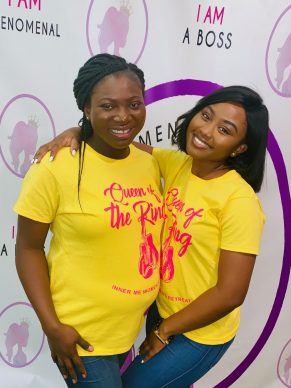
Women of Value, Inc.
The ultimate goal is to build a vocational school for women in Ghana. I’m from Ivory Coast, but my dad is from Ghana. I didn’t grow up knowing that part of me. Recently, I’ve had the opportunity to go to Ghana one or two times per year. I see what the women are going through there. I’ve gotten to know Ghana, and the kind of work I want to do will be effective and impactful there. The school will be for women who didn’t have an opportunity to go to school, but can still learn a trade to be able to take care of themselves and become independent. I’ve already gone and done the research and discovered what we need to build the school. I launched something called the Just a Dollar project. The idea is that anyone can donate even a dollar. So if we got 50,000 people to donate a dollar, then that’s $50,000. We wanted to make it affordable for everybody to donate towards purchasing the land and building the school. Once we get to that point, we’ll think about hiring the staff or finding volunteer staff.
Another way you have empowered women is through your clothing line, Le Regard Apparel. How does this tie into your other work?
I came up with Le Regard Apparel when I had my daughter four years ago. I have always been a working woman and working mom. As a professional, it was difficult for me to pump at work or nurse my child. I would go to church and think, “I don’t want to wear a t-shirt so I can nurse my child. I want to wear a beautiful dress.” So, I created an amazing one piece dress. It is phenomenal. You’re able to nurse with the dress and pump with the dress. If you have twins, it makes it easier to nurse at the same time.
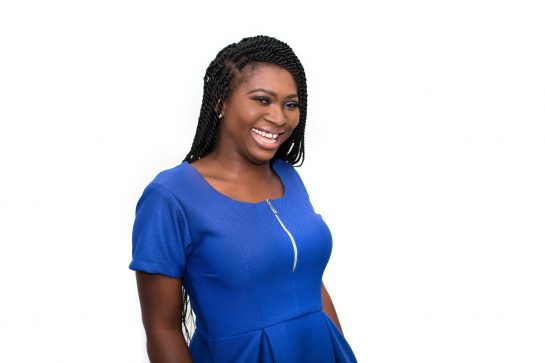
Ruth Yeboah.
It’s a small business that’s slowly picking up. We’ve met some challenges when it comes to production, but we’re back in stock and we’ll be selling again soon. When I initially launched the line, people were really excited. I used kickstarter to raise $10,000 in 30 days. I also designed an innovative suit. It’s discrete and wonderful, but not on the market right now. I trust that Lord will help us find the right people to push this brand where it needs to go.
This clothing line all goes back to women and independence. If I am a woman who wants to work, look good, and feel good, I don’t want to feel like pumping is so difficult and so hard every time I have to do it. Being able to still feel beautiful is important. The dress is so flattering that it fits anybody. You can be thin, big, tall, or short, it flatters every single body type. Now that I’m pregnant again, I actually get to use it. When I had my first, the dress wasn’t created yet and pumping was so difficult. Le Regard Apparel exists to empower that woman to be the professional she wants to be and still be a mom. I definitely had the modern woman in mind.
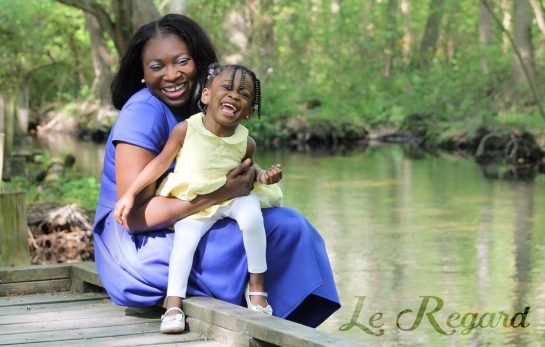
Ruth with her daughter.
How has your faith in Jesus Christ influenced your choices as you’ve worked to build a lasting legacy?
I’m very big on legacy. A lot of times we lose sight of why we are even here. I know my purpose is to serve people. My job at the military serves people. I’ve always been in the social service world with foster care and all of that. I was a child protective specialist. Now I have my own organization: Women of Value, Inc. which is all service.
When I think about my legacy I want people to be able to say, “Because of Ruth, my child was able to go to school. Because of Ruth, I was able to leave a relationship that was detrimental to my mental health and detrimental to my life. Because of Ruth, I was able to go back to school even though I had children and thought I couldn’t do it. Because of Ruth, anything I set my mind to I was able to do because I got the courage to do so.”
Right now, even in my own little way I’m hearing people tell me that already. I’m seeing results in the impact that I’m creating in my community. I’m not caught up in numbers. I can have an event with 10 women and still consider it a success. It’s not about the numbers because you can’t help everybody. My intent is to leave every woman with a piece of my heart that is filled with love, care, and respect. So that women are built with self-esteem and confidence to go on. It goes along with my faith in Jesus Christ because my faith tells me to never give up. I don’t ever give up on anything. Anybody you ask about me will tell you that Ruth is a jack of all trades or Ruth is always busy and doing something. I keep running because I truly believe that I’ve been given so much. Trying to balance and maximize the gifts and talents that the Lord has given me is what causes me to be so tired. I’m really able to do a lot of things and I don’t take that for granted. I make sure that I fulfill my duty and my calling as needed.
Is there anything else you would like to add?
One last word, a lot of us spend time and our entire life chasing after things. Center yourself and think about what is the purpose of your life. Really, what is your purpose? Start looking at what is your contribution to other people. We weren’t created to exist alone. We are meant to coexist. Coexistence brings up questions like how do you treat other people? Is respect and honesty key when your dealing with people? Are you mindful of other people? It’s important to really reassess your life and ask why you’re doing the things you’re doing. Is it for people? Is it for myself? What is the ultimate goal?
At A Glance
Name: Ruth Yeboah
Age: 33
Location: Dover, Delaware
Marital History: Married
Children: 4 year old daughter
Occupation: Founder of Women of Value INC. Domestic Abuse Victim Advocate, US Air Force
Converted to Church: October 2000
Schools Attended: Brigham Young University. Provo BS Widener University, PA in MSW
Languages Spoken at Home: English, Twi, French
Favorite Hymn: The Spirit of God
Websites: Www.thewomenofvalue.org, and https://www.shopleregard.com/
Instagram: @womenofvalueinc, @leregardapparel, @theruthyeboah
Interview Produced by Anne Leishman Merrell
